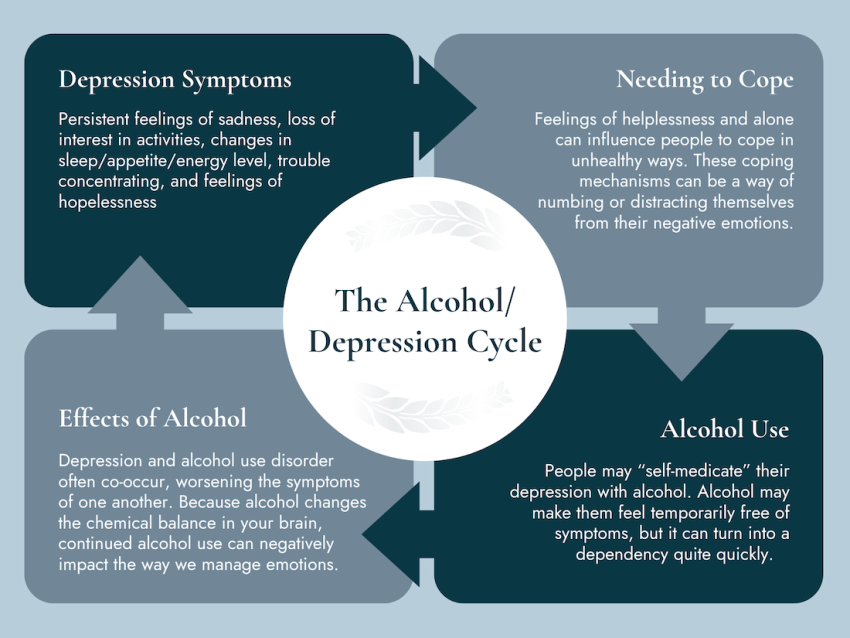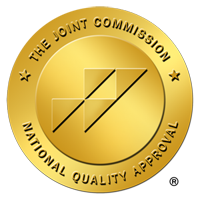Depression is one of the most prominent mental health disorders in the United States. It is not uncommon for people who struggle with depression to try and self-medicate, particularly with alcohol.
People who struggle with depression are more likely to develop an alcohol abuse disorder, in large part because of the connection between alcoholism and depression.
On the other side of that, alcohol consumption is legal for anyone over the age of 21, which makes it one of the most accessible addictive substances in America. Those who are military or First Responders and exposed to trauma on a regular basis or uniquely stressful work environments might not have recourse for traditional therapy or medication because of the pressures of that same job, so they turn to alcohol.
That alcohol consumption can lead to the development of depression in someone who doesn’t already have it.
But why?

The Neurological Connection Between Alcoholism and Depression
When someone has a depressive disorder, it is generally tied to the neurochemicals in their brain. For most, depression is linked to a lower-than-normal level of things like serotonin, a neurotransmitter. This doesn’t happen just once or a few times per week but is, rather, a chronic condition with regularly low levels of things like serotonin.
With low levels of key neurotransmitters essential for regulating mood, sleep, and appetite, individuals are more likely to have emotional instability and depression.
So, what is the connection between alcoholism and serotonin?
- Alcohol is a temporary stimulant that increases serotonin levels
- Consuming alcohol when depressed can lead to relaxation and better mood regulation
This means someone with depression will turn to alcohol to feel better, and they legitimately will feel better temporarily. So they turn to it again and again to achieve that same feeling.
However, the connection between alcoholism and depression gets a little darker.
- Alcohol is a central nervous system depressant, so regular use actually depletes serotonin over time, exacerbating depression symptoms and leading to the development of depression in those who don’t already have it
- The alcohol withdrawal that most people experience as a hangover causes serotonin activity to search, encouraging the cycle of continued alcohol consumption but leading to the cycle of continued serotonin depression
This means that someone who doesn’t have depression will still feel better when they drink because of the increase in serotonin levels, and someone who does have pre-existing depression will also feel better because of that serotonin increase.
However, when the alcohol starts to get processed by the liver, and those effects wear off, the withdrawal leads to another surge, prompting individuals to drink more.
In the long term, serotonin levels will continue to deplete because of alcohol consumption, so someone who didn’t have depression before they started drinking could develop depression because of long-term alcoholism, and someone who already had an existing depressive disorder could experience worsening symptoms long-term.
Co-Occurring Disorders
This connection between alcoholism and depression can lead to the development of what is called co-occurring disorders, necessitating dual diagnosis treatment. Co-occurring disorders are exactly what the name implies: two disorders that take place at the same time.
In this case, those two disorders are:
- Alcoholism
- Depression
Successful treatment requires rehab programs that offer detox for alcoholism and ongoing therapy for both alcoholism and depression.
Getting Help for Alcoholism and Depression with American Detox and Treatment
If you are struggling with co-occurring depression and alcoholism, you can turn to our inpatient rehab program for help. We currently offer specialized treatment pathways for first responders and military veterans who have higher rates of depression and alcoholism, with access to full-time therapists and psychiatric nurse practitioners.
The treatment programs offered to tackle the connection between alcoholism and depression can include inpatient or outpatient programs.
Inpatient programs offer a more comprehensive solution with full-time supervision where you reside at your treatment center. This is generally recommended specifically for the detox part of your program, as alcohol detox can come with significant side effects.
As you move through the different levels of care, residing at your treatment center versus residing at home, you’ll learn how to recognize things like underlying trauma that may have contributed to your depression in the first place and led to the alcoholism or contributed to the alcoholism which led to the depression. You will also gain insight into personal triggers, things that might encourage an uptick in depression symptoms or alcohol consumption, and how to overcome those with more proactive solutions and behaviors.
Let us help you find a customized treatment pathway today.


